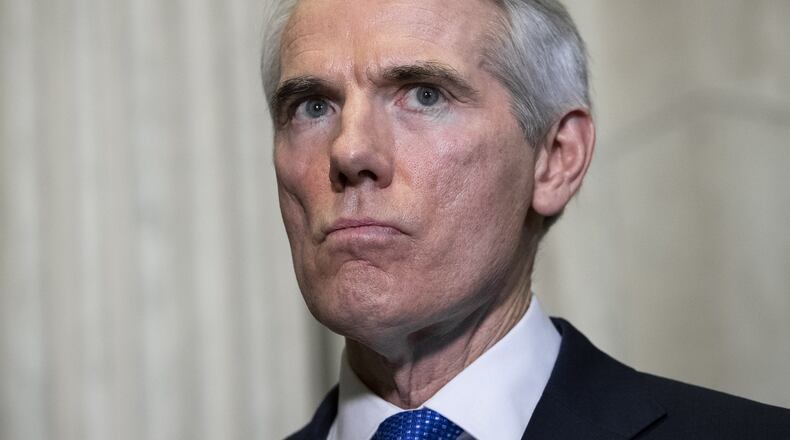This year, he’s got a new partner in the fight: Rep. Troy Balderson, a Zanesville Republican, introduced a House version of the bill late Friday, just as the latest latest shutdown was coming to an end.
Their bills come with repercussions aimed at keeping Congress from just passing the same spending bills at last year’s levels without the sort of oversight that the Constitution requires.
How it would work
After 120 days, if Congress still didn’t pass its spending bills, they’d reduce spending levels across the board by one percent.
After 90 days, it would go down another one percent.
The idea, Portman said, is to provide a threat to motivate Congress to act.
Every Congress he introduces the bill. Every Congress it goes nowhere.
But this year, Portman said, may be different: The bill was introduced on the heels of a 35-day-long shutdown that was the longest in the nation’s history.
There’s also a level of urgency: Congress has fewer than three weeks before the current agreement, which runs through Feb. 15, expires.
But Portman’s idea is the one that seems to have the most support.
Portman had 18 cosponsors, all Republican, as of Friday and he expected to have 20 by the end of Monday. And Democratic interest is there. Both House Speaker Nancy Pelosi and Senate Minority Leader Chuck Schumer have embraced the idea conceptually; whether that means they’ll support Portman’s bill is yet to be seen.
Portman says now is the time to change process
“I think there’s more appetite for this bill today than I’ve ever seen,” Portman said, saying this most recent shutdown made Democrats and Republicans alike realize shutdowns “are only effective at hurting taxpayers and government workers.”
Balderson, meanwhile, who is still in his first few months of Congress, never thought this would be the first bill he’d introduce.
“It was the farthest thing from my mind,” he said, saying he would never have anticipated starting this Congress with part of the government shut down.
He said, though, that the bill is a worthwhile one to introduce. Shutdowns, he said, are “not fair” to government employees or taxpayers.
“We pay our people when they work,” he said. “To not pay Americans when they do their job is just not fair.”
He’s already got a Democratic cosponsor on his bill — Jeff Van Drew of New Jersey — and said he’s working the phones to gather more cosponsors.
He doesn’t think it will be difficult to get support. “It’s not really going to be that hard to sell it,” he said. “All I have to say is how unfair this is to the American people. There’s no greater talking point than that.”
How President Donald Trump feels about the bill is to be seen. Asked about it at a White House briefing Monday, White House spokeswoman Sarah Huckabee Sanders said, “The hypotheticals of taking that off the table — I haven’t seen a piece of legislation for us to even consider at this point that would make that a reality but what I do know is the president is committed to fixing the problem.”
Portman said the bipartisan group he’s worked with is hopeful that the ultimate immigration agreement will do two things: Give Democrats some wins on immigration, such as an agreement allowing those brought here illegally as children to stay in the country; give Republicans a win with border security money and finally, end shutdowns forever.
“It’s a tight turnaround,” Portman acknowledged, but said, “It’s been introduced in the last five Congresses, so there’s been plenty of vetting of it.”
About the Author
